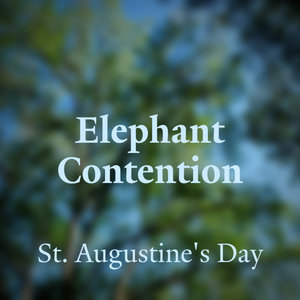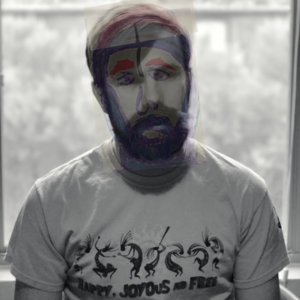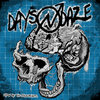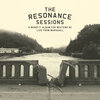Elephant Contention by St. Augustine's Day

These songs are serving as my final project for my class, Theologies of Religious Pluralism. It is my attempt to articulate my own theology of religions.
Here is the text I submitted as a supplemental reflection for the project.
The assignment to articulate my theology of religious pluralism felt like a daunting task, but somehow less daunting when given the option to do this through song instead of through an academic paper. I have used songwriting as a form of self-expression since middle school, and it often feels like my most comfortable means of communication. When I am at a loss for words in speech or prose, somehow the form of a song allows me to express what felt inexpressible. Songwriting felt especially conducive to this project because over the course of the last semester I have realized my theology of religious pluralism bends toward a mystical approach and mysticism is sometimes at odds with the theology. I am attracted to what some might call a “humility model” as a theology of religions. I feel grounded in my beliefs while also embracing the possibility I could be wrong in a multitude of ways, especially with specific theological concepts. This is part of why I value experience so highly. Theological ideas can be argued ad infinitum. It is much harder with someone’s personal experience.
The two scholars we read this semester whose work most resonates with me are Raimundo Panikkar and Mark Heim. I appreciated the trinitarian focus of their work as well as their intentions to neither erase particularity nor promote an exclusive view. In Panikkar’s work, I especially appreciated his affirmation of a mystical approach. A primacy on the experience of God resonates with my own faith which I touch on in my third song, “Many Rooms.” In my senior year of college at a concert, I had a profoundly transformative experience. It was an overwhelming feeling of the presence of God, and to me, it felt specifically like the Spirit of Christ. It is hard to explain why, but it had a lot to do with feeling guilt for my sins followed by an immediate wave of loving forgiveness and acceptance. I recognize that while this felt like Jesus and/or the Holy Spirit to me others having a similar experience may use different language to describe it. This probably makes me what I would call a modest inclusivist. I use the term modest because I recognize it is possible it was not the Spirit of Christ I encountered that night. I believe it was, but I cannot be certain. Either my Christian faith enabled me to recognize Christ’s presence or my Christian faith caused me to interpret the experience as the presence of Christ even if it was something else. I claim the term inclusivist because I believe that when human beings of any religion mystically encounter the divine they are experiencing a connection to the Triune God through the Holy Spirit. If I were to employ the popular analogy of blindfolded individuals touching different parts of an elephant, I would propose the elephant is the Trinity. This idea carries with it some resonances with Mark Heim’s trinitarian theology of religions.
One of the things I highly appreciated about Heim’s view was his recognition that many religions seek different ends. Not everyone is looking for full communion with God, and other religious purposes can be worthwhile and good with some even have unique qualities that may grasp aspects of the Triune God in a deeper or more intense way than a Christian aim of full communion (Heim 283). Returning to the elephant analogy, just because still-blindfolded Christians happen to know what they are touching is an elephant does not mean they are as deeply familiar with all the detailed textures of the elephant’s tusks, tail, trunk that others may be touching. An aspect of Heim’s work that I would challenge is his metaphor of separate mountain tops. As I sing about my final song, I prefer an image of one home with many rooms which of course references Jesus’ words in John 14:2. To me, a concept of distinct mountaintops implies (even if unintentionally) a sort of disconnection between eternal destinations. I believe the afterlife may have many different dimensions and souls may have different experiences, but I also believe that there will be a profound divine union of all these experiences. Just like any house, not all the rooms would be identical, but they will all be in the same home.
Of course, I could be wrong.
Bibliography
Heim, Mark. The Depth of Riches: A Trinitarian Theology of Religious Ends. Grand Rapids, MI:
Wm. B. Eerdmans Publishing Co., 2001.
Panikkar, Raimundo. “The Jordan, the Tiber, and the Ganges: Three Kairological Moments of
Christic Self-Consciousness.” The Myth of Christian Uniqueness: Toward a Pluralistic Theology of Religions. John Hick and Paul F. Knitter, eds. Eugene, OR: Wipf and Stock Publishers, 1987.
Tracklist
| 1. | The Only Way | 4:41 |
| 2. | All the Same | 4:53 |
| 3. | Many Rooms | 4:36 |
Credits
License
All rights reserved.
A native Texan, Will Parker (he/him) has been immersed in a wide range of musical influence over the years--as is apparent in his tendency to fuse genres. From lyrical rap to folk punk to kid’s music, he uses a variety of styles in his songs. Seen on guitar, ukulele and harmonica, his shows are engaging, high-energy and often involved audience participation.
staugustinesday.com
Facebook
Instagram
Twitter
St. Augustine's Day





